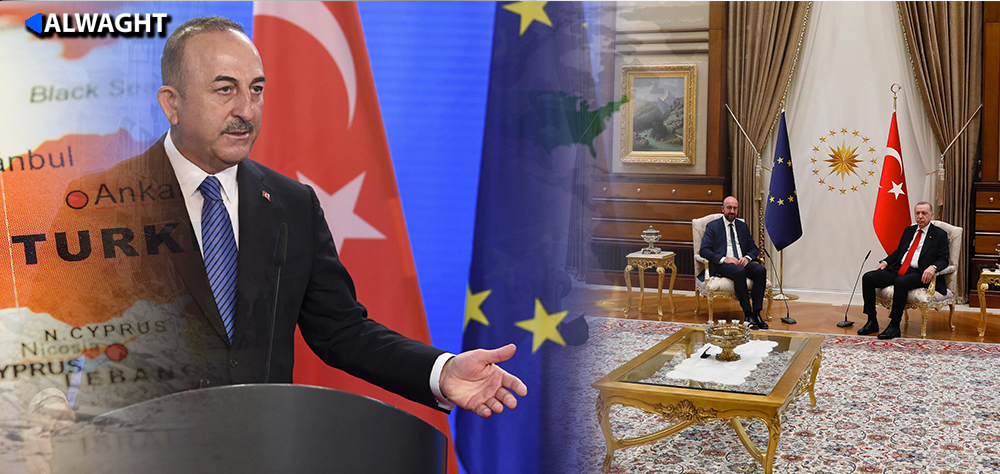Alwaght- Over the past months, Turkish accession to the European Union gained media and observers’ focus. The fresh talk of the Turkish membership in the European bloc certainly stems from the efforts of President Recept Tayyip Erdogan to open a “new page” in the Turkish-European relations and is influenced by a general pro-deescalation trend that for months has begun to govern Ankara’s regional and foreign policy.
The German Marshal Fund think tank, for example, held in February and April webinars named “EU-Turkey Relations: In search of Positive Agenda”, revealing the Turkish lobbying to make its way to the EU membership. But contrary to this goal, recent developments, especially the European Commission President Ursula von der Leyen’s Turkey visit scandal, have clearly shown that the European Parliament's approach is to set aside the positive agenda in the way of de-escalation with the Turkey.
With his look to East failed, Erdogan looks back to Europe
Erdogan's new vision and plan to pave the way for Turkey's entry into the EU is an undeniable result of the Western pressure on Ankara to quit its policy of looking to the East, as well as the failure of Erdogan's regional policies over the past few years. Over the past few years, Turkey has moved in the opposite direction to Ankara's traditional alliance with the West, especially the US and Europe, pursuing a strategy of proximity to the East, including Russia, China, and active intervention in West Asia and the Mediterranean. Europe has put intense pressure, including resorting to sanctions, diplomatic pressure and political threats, on Ankara in order to bring it back to the Western camp.
At the regional level, after several years of adopting an interventionist approach, Erdogan has not made very lasting and permanent gains in many areas, and arrival of Joe Biden as the US President, who is fundamentally opposed to Erdogan, put further strains on the Turkish leader. Erdogan has now embarked on a strategy of closer ties with the Europeans and de-escalation of tensions with the Biden’s US in a bid to manage the new situation in the international order. In his latest remarks, he criticized the European bloc for not adhering to its commitments on the Turkish accession.
“Turkey keeps its determined stance and efforts towards its strategic goal of European Union membership, despite the double standards and obstacles it faces. Turkey’s membership will pave the way for the rise of a Europe that is more effective at regional and global levels, gives hope not only to its citizens, but also to the people of its neighborhood as well as the whole world,” a statement by Erdogan on Sunday read. His statement, released for the Europe Day, accused Europe of “strategic blindness.” But just contrary to Erdogan’s optimism, the EU seems to have a different vision.
“Sofagate” and making maximum demands from the EU
Behind the different approach and the EU opposition to the Turkish membership and the closure of the case of the “positive agenda”, the “sofagate” seems to have played as an essential provocation. Sofagate was a diplomatic scandal during a meeting between Erdogan, EU Commission chief, and EU Council President Charles Michel. When the two European officials attended the meeting, the female chief of the EU Commission was left without chair and had to sit on the sofa while Erdogan and Michel sat on presidents’ chairs. In fact, Leyen had to sit on a sofa facing the Turkish Foreign Minister Mevlut Cavusoglu with whom she was not at the same diplomatic level.
The incident caused a great deal of controversy among the media and political observers and became known on social media as "sofagate". Erdogan's action was described by many political analysts and, of course, the European Commission as an insult to the chair of the commission and a symbol of Erdogan's misogyny and sexism. The incident happened less than a month after Turkey's official withdrawal from the Istanbul Convention on Preventing and Combating Violence against Women. Many argued that the scandal showed the inequality of the vision of the Turkish leaders to the women and their rights in the society. The scope of the controversy was so wide that Professor Cengiz Aktar of Suleyman Sah University of Istanbul called it a key reason for the end of the positive agenda on the Turkish accession to the EU.
EU demands Ankara respect to human rights at home
Following the sofagate scandal and to Erdogan's frustration, the EU, and mainly Germany, is now more opposed to Turkey's accession to the Union than ever. The European Parliament's Foreign Affairs Committee recently called on Turkey to “re-evaluate its commitment” and prove its sincerity. The committee concluded in its latest report that Turkey's lack of progress in conforming to European standards and values has become a complete setback and a “backsliding” in the rule of law, fundamental rights, institutional reforms, and foreign policy.
The worse news for Erdogan is that if The Greens party rise to power in Germany, the Chancellor Angela Merkel’s tolerance with Ankara will be set aside and there will be more focus on human rights, rule of law, arms control, and women’s rights the outcome of which would be end of Turkey’s EU accession dream.



























